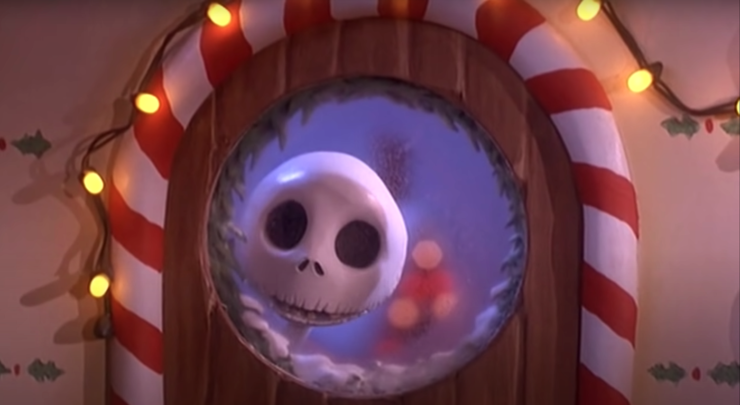December’s a minefield. Most of the year you can watch movies or TV shows, and you more or less know what you’re in for. If you’re watching the latest Martin Scorsese movie, things will probably get heavy. If you’re watching a sitcom, the stakes will probably be low. Even now in the era of prestige TV and extremely niche indie films—when the writing is, I think, sharper than it’s ever been, and creators feel free to hop genres and assume their viewers’ intelligence—you can usually decide how much depth you want to deal with, and tailor your viewing accordingly.
But not in December—in December even the wackiest comedies have to stop the action long enough to meditate on capital-M Meaning, and the grittiest dramas make room for capital-M Miracles, in order to acknowledge the annual cultural fulcrum that is Christmas.
In all of my searching I have found only one film that ignores this tradition of meaning-making. That movie is The Nightmare Before Christmas.
The Nightmare Before Christmas is a fairly straightforward story: a living skeleton has a mid-life crisis and decides that, since orchestrating Halloween doesn’t make him happy the way it used to, he’s going to take Santa’s place on Christmas Eve. Over the course of 76 minutes, it draws inspiration from The Night Before Christmas, How the Grinch Stole Christmas, Rudolph the Red-Nosed Reindeer, The Bride of Frankenstein, and, in a sideways way, It’s a Wonderful Life as Jack Skellington learns that his true happiness has been right in front of him the whole time.
But one thing the film does not do, which sets it apart from all of its referents, and as far as I can remember, from the entire Christmas canon, is give us any Meaning of Christmas.
All the specials The Nightmare Before Christmas riffs on provide Meanings like crazy: Charlie Brown gives us an explicitly Christian meaning, but builds on that by gently implying that offering love and acceptance to the broken—whether outcast boys or spindly trees—is part of the holiday; Rudolph bypasses religious references and posits that Christmas is a time for general openness, generosity, and found family; the Grinch steals all the “stuff” of the Whos’ Christmas, but comes to realize that “Christmas, perhaps, means a little bit more”—the special doesn’t go into what that “more” is, exactly, but the Whos singing and feasting together seems to be part of it.
Most specials, television shows, and movies, from It’s A Wonderful Life to VeggieTales to Stephen Colbert’s 2006 special The Greatest Gift of All! to the in-universe Bojack Horseman holiday episode, come to a head around an uncanny event: the confirmation of Santa’s existence, an angel/God saving someone, snow falling miraculously to save a vampire, or at the very least a vague idea of “Christmas spirit”—something extra-normal that brings people together. Hell, even National Lampoon’s Christmas Vacation has the Griswolds gaze up into the stars while Clark gave a speech about the True Meaning of Christmas, and Home Alone peppers in a few scenes of Kevin McCallister going to church and bonding with an elderly man in between setting traps for the Wet Bandits. Even “dark” holiday films like Bad Santa and Krampus, or horror movies like Black Christmas, are self-consciously setting themselves against the usual holiday fare. The films depend on our understanding Christmas as a meaningful time so they can subvert our expectations.
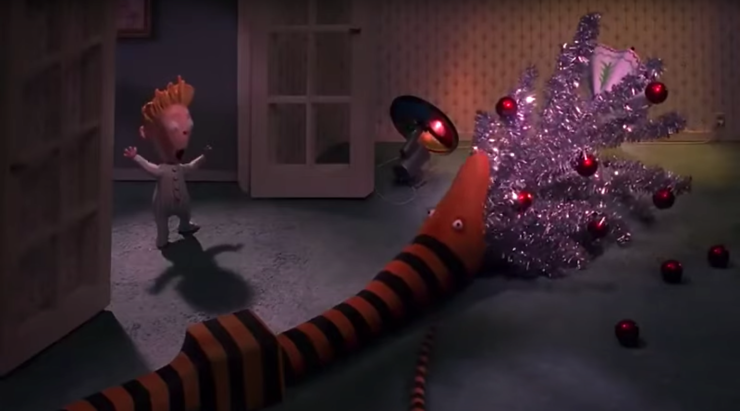
But Nightmare’s Christmas stands apart: the film doesn’t want to bash you about the head with the idea that there has to be a Meaning.
The story begins in an extra-normal space and proceeds from there. Jack is a (seemingly-immortal) living skeleton who is the King of Halloweentown, which also democratically elects a mayor. Makes sense. Everyone in Halloweentown is supernatural: ghost dogs, vampires, werewolves, clowns with tear-away faces, etc. Halloweentown exists in relation to realms dedicated to other Western holidays: Thanksgiving, Christmas, Easter, Valentine’s Day, and, bafflingly, St. Patrick’s Day. (I would kill for a sequel that takes us to the inebriated horrorshow of St. Patrick’s Day Land.) So we can guess, from what we’ve seen in Halloweentown, that the other holiday worlds are also full of immortal beings, including Santa Claus and the Easter Bunny. But having started from this place of mythology, where vampires and Santa and St. Patrick are all equally, indisputably real, the film goes on to focus on the stuff of the holidays. And it may be the only Christmas movie where the “Meaning” of Christmas isn’t ever found.
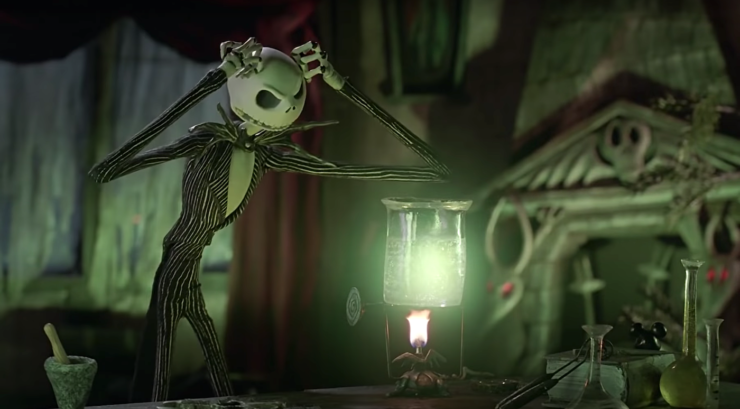
And what of Jack? It’s his existential crisis-turned-conversion experience that fuels the movie. He wants to understand the feeling of Christmas—”invisible but everywhere”. In order to do that he studies snowflakes, ornaments, candy canes, repeatedly asking “What does it mean?” and later sings:
Simple objects, nothing more
But something’s hidden through a door
Though I do not have the key
Something’s there I cannot see
and, a moment later:
I’ve read these Christmas books so many times
I know the stories and I know the rhymes
I know the Christmas carols all by heart
My skull’s so full, it’s tearing me apart
As often as I’ve read them, something’s wrong
So hard to put my bony finger on
—implying that Christmas is a feeling or spirit that he can’t access. Finally he declares that “just because I cannot see it, doesn’t mean I can’t believe it”—but believe what, exactly? Before he nails down what the elusive feeling is, he decides that the only way to get closer to it is to embody Santa. He’s like a Catholic convert deciding to skip CCD classes and instead become Pope.
As the film continues the embodiment of Christmas is more explicit. The song “Making Christmas” shows us that the rest of Halloweentown thinks that the holiday is a thing to be manufactured, literally, through the production of presents. And when Sally’s fog rolls in and the little boy says “There goes Christmas”, it seems that they all think “Christmas” is the act of going into the world with gifts and wreaking havoc.
And then of course we come to the most important part of the movie. When Jack gets shot down on Christmas Eve he is saved by a signifier, not the signified. Not a real angel, a Clarence or a Dudley or a Feist or a Dolly Parton, but a statue of an angel, stone-carved and silent.
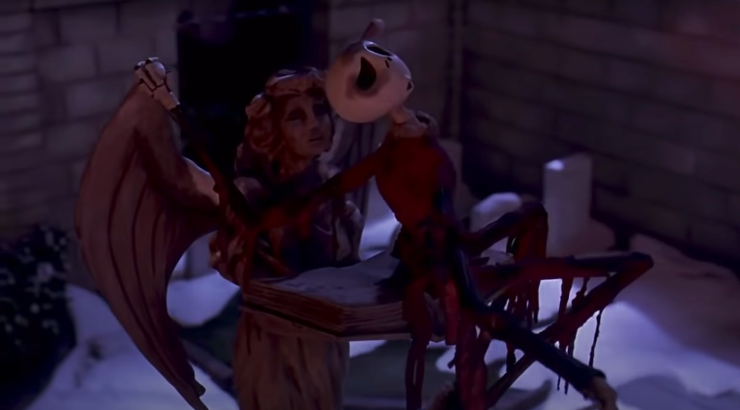
Jack sings “Poor Jack”, and realizes he’s screwed up, and decides to give being The Pumpkin King another shot. This is also the film’s only reference to God (also rare for a Christmas movie to not have at least a light implication of divinity) which implies that God exists in the universe of the film, since Santa, the Easter Bunny, and Jack himself all do. But here again, what does it mean? As I mentioned, Jack is the undisputed, immortal ruler of not just Halloweentown, but Halloween as a concept, and yet when he wants us to know he’s serious about something he invokes a deity that is never otherwise mentioned. So why bring it up now, in a theological vacuum? The holidays represented in the forest between worlds are all Western, commercialized holidays that can be practiced as easily by secular people as by those who are religious. There isn’t a tree-portal for either of the Eids, or for Buddha’s birthday, the Feast of the Three Kings, or Yom Kippur. So when Jack uses the word “God” how are we supposed to take that?
I mean, I don’t know, I’m legitimately asking. This has been bothering me for years.
But to get back on track: none of this brings us to any conclusions about what constitutes Christmas in this story. According to the narrative beats in most Christmas specials, this should be the moment when Jack reckons with a larger Meaning of Christmas. But what he focuses on instead is that he messed the holiday up, and, crucially, that the way to “set things right” is to set Santa free to deliver presents.
Which means Santa isn’t rescued by angels or elves or red-nosed reindeer—initially he’s saved by Sally, who does a rather disturbing riff on a striptease to distract Oogie Boogie. After she’s captured, too, it’s left to Jack to swoop in and set the two of them free. (My colleague Emmet Asher-Perrin insists, and I agree, that the subtext here is that Jack and Oogie had a thing, a serious THING, and at least some of the viciousness of the battle is fueled by that? It would certainly explain the tone.) The big final boss battle isn’t between Good and Evil, Santa isn’t powerful enough to save himself, there is no cosmological safety net—the stakes seem to be that if Jack fails, not only will he, Sally, and Santa die (whatever that means in this universe) but also that this will… end Christmas? All because Santa won’t exist to deliver presents.
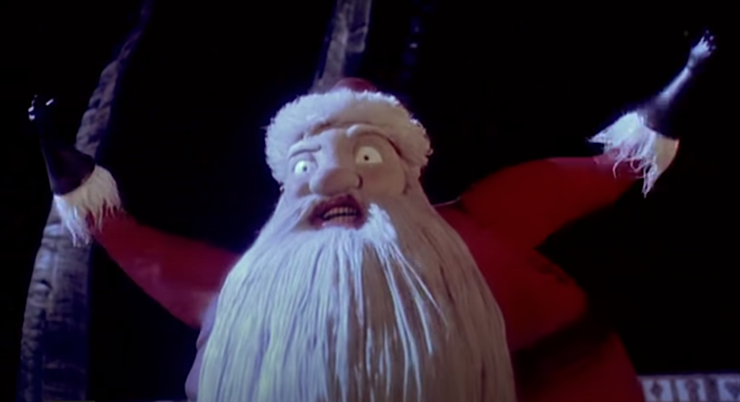
But that whole existential abyss is moot, because Jack wins, straight up murders his enemy, and then anxiously asks Santa if he can fix everything. Santa, who has just been kidnapped, tortured, and just watched a bug monster die at the hands of a living skeleton, says “Of course I can fix it, I’m Santa Claus!” lays his finger alongside his nose, and flies away.
And…that’s it. There’s a montage of Santa doing a Christmas Eve speed run to replace all of Jack’s (fucking awesome) presents with more traditional ones. (Again, since only Christmas is represented, and Christmas’ entire purpose is receiving gifts from a Santa Claus who is objectively real in the universe of the film, any families who don’t celebrate Christmas are presumably screwed out of this windfall.) Santa even takes the time to swing by and give Halloweentown its first snowfall. But this isn’t miracle snow. This isn’t snow falling to save Angel the sad-sack vampire from sunlight, or a sudden cold snap to re-incorporate Frosty, or rain changing to snow to tell us that George Bailey is back in the right timeline. It’s just snow for snow’s sake. Jack and Santa don’t have a heart-to-heart about the essences of their respective holidays. The rest of the citizens of Halloweentown are openly relieved that Jack is back to normal. And the big culminating image isn’t anything to do with Christmas: it’s Jack and Sally kissing in the cemetery, which does not complete the narrative throughline of the movie. Their romance is a (lovely!) cul de sac.
The opening of the movie is that Jack feels empty, and that his life has lost meaning. He discovers Christmas, and makes learning Christmas his new purpose—but he never actually learns the Meaning of Christmas. “Jack’s Lament” and “What’s This?” are all about searching for something indefinable, and “Poor Jack”, the song he sings after he realizes he can’t be Santa Claus, muses on his failure to find it. And sure, he realizes that his job as the Pumpkin King is actually what he loves, but a verse before that he basically says he should give up and let himself die because he can’t understand Christmas.
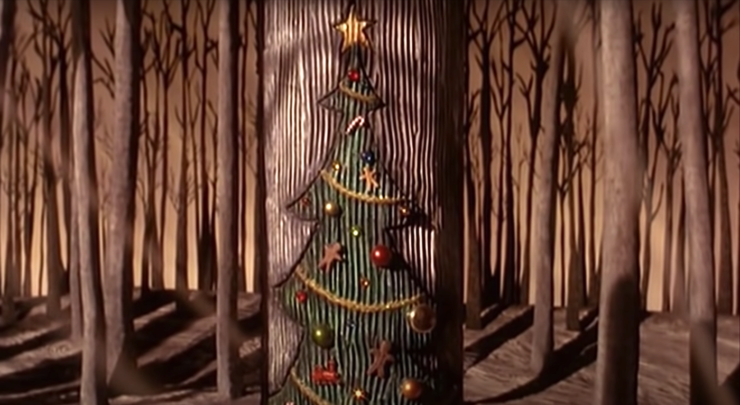
So maybe the film does think the holiday has some intrinsic meaning, and acknowledges that the dispensation of presents isn’t it, exactly, but neither the hero nor the audience are ever given access to the “something hidden through the door.” Christmas rolls on, Jack’s friends and colleagues go back to normal, Dr. Finkelstein has a new bride, Sally begins a partnership with her crush. But Jack is never allowed into Christmas, whatever that means.
And that’s… OK? I think part of the beauty of The Nightmare Before Christmas, and part of why it’s become such a classic, lies in Jack’s ultimate failure. He tries really hard, but in the end he never quite gets it, the movie never holds his bony hand to explain it—and that’s fine. The movie also never sits us down to lecture us about the True Meaning of any of the holidays. It allows us space to celebrate however we want! Or to not celebrate at all, and instead bask in the beauty of killer stop-motion animation, free of the pressure to think about what any of these holidays mean to us. And isn’t that a beautiful relief from the whirlwind of emotion and expectation we fall into each December?
Leah Schnelbach and writing about Christmas movies were simply meant to be. Come be jolly with them (or not, your call) on Twitter!










